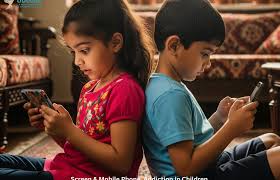Listen To This Post
Written by: DINESH SOOD
Thenewsdose.com
India’s youth is often hailed as its greatest asset; however, excessive digital habits are jeopardising this potential. As screens bombard our children—from smartphones and streaming services to gaming and endless scrolling—a troubling pattern is emerging: attention spans are shrinking, social skills are fading, and physical health is deteriorating.
As a dedicated skill alliance partner with the National Skill Development Corporation (NSDC), we directly witness this transformation among thousands of young learners across India and abroad. Students entering our training programs today do not lack aptitude; they lack attention. Their curiosity is high, but their focus is fractured. The battle against screen addiction extends beyond parental concern; it is an urgent educational, social, and national priority.
Screen Dependence: The New Learning Deficit
According to a 2023 UNICEF India study, children aged 10 to 17 now spend an alarming average of 4.4 hours a day on recreational screen time—up from just 2 hours before the pandemic. The World Health Organisation warns that prolonged screen exposure during formative years can stunt brain development, hinder language acquisition, and lead to chronic sleep deprivation.
Closer to home, counsellors are reporting a disturbing increase in anxiety, irritability, and plummeting grades—classic symptoms of what psychologists call “digital fatigue.” In training centres, instructors are increasingly observing that learners struggle to engage in sustained physical or skill-based activities, whether related to hospitality tasks or creative design projects. The irony is stark: while the digital economy opens new doors, unchecked digital dependence undermines the concentration and discipline vital to seizing those opportunities.
From Addiction to Action
Skill training is the definitive antidote to passive screen time. When learners shift from merely consuming content to actively creating value—from tapping screens to handling tools, engaging in the performing arts, mastering grooming tasks, working with robotics kits, or coding—they rediscover their purpose.
Our extensive experience across India and numerous international partnerships demonstrates that hands-on skill learning revolutionises not just employability but also lifestyle. Students who once squandered their evenings on gaming are now developing essential grooming and makeover skills, crafting innovative wearable prototypes and jewellery, repairing drones, or volunteering as sports coaches. The focus must move from chasing fleeting dopamine hits to committing to deliberate practice.
This vision aligns with our mission to cultivate a skilled, confident, and future-ready youth base that recognises learning as a lifelong, balanced pursuit. Training academies must incorporate Digital Discipline modules into every skill program. Before starting technical training, students must undergo a rigorous 7-day “Detox to Focus” workshop, emphasising screen-time awareness, self-regulation, and daily movement goals (a minimum of 45 minutes of physical activity, such as sports or yoga). They will also learn to use technology mindfully—transforming phones into tools, not toys—and participate in peer mentoring circles to discuss vital topics like sleep, focus, and motivation.
The results will be undeniable. Within just one year, we can expect marked improvements in attendance, hands-on performance scores, and overall mood and discipline among trainees. The message is clear: when training becomes experiential and engaging, screens lose their grip.
Digital Inclusion with Human Connection
The global conversation about excessive screen use is escalating, and it’s time for decisive action. Japan’s Ministry of Education has taken the critical step of capping screen exposure in schools, while employers in the UK are proactively offering “digital detox” retreats for their staff. India must seize this moment to lead with a robust model—“Digital Inclusion with Human Connection.”
By directly linking the National Skill Development Corporation’s (NSDC) skill mission to public health goals, we can unequivocally demonstrate that productivity and well-being are not opposing forces; they are powerful allies. The future workforce will demand more than just coding skills; essential human qualities like concentration, empathy, and teamwork are non-negotiable for success, and they cannot be nurtured solely through a touchscreen.
Fostering Focus as a 21st-Century Skill
India’s next major initiative in skill development must be addressed as a paramount frontier. We must establish focus, discipline, and emotional balance as measurable competencies within our educational frameworks. Policymakers will have to incentivise skill development partners to integrate mental wellness and physical activity modules into their curricula. Let’s implement national awards to recognise “screen-light” schools and academies that excel in promoting digital balance programs.
Private organisations should be mobilised to create impactful, expert-led videos in Hindi and regional languages that emphasise digital hygiene and encourage sports participation, specifically targeting youth in Tier 2 and Tier 3 cities.
Establishing a Healthier Digital Culture
The recent advisory from Haryana Police advocating for screen-free routines in families is a vital and timely intervention. Yet, to achieve lasting change, this initiative must extend far beyond the family unit to encompass schools, skill development centres, and community programs. Here’s how the skill development ecosystem must rise to the challenge:
1. Integrate “Digital Wellbeing” into All NSQF-Certified Courses: Every trainee—whether in retail, healthcare, or engineering—must learn how to balance screen use and productivity effectively
2. Launch Community Sports and Skill Festivals: Our academies must collaborate with district administrations to create “Screen-Free Sundays” that blend local sports, skill exhibitions, and career workshops.
3. Implement Parental Engagement Sessions: Parents deserve guidance on managing digital behaviour just as much as their children.
4. Promote Hybrid Learning Wisely: Digital tools should be leveraged to enhance learning, but must be complemented with tactile, human interaction to engage students fully.
The Screen as a Tool, Not a Trap
As trainers, mentors, and leaders in nation-building, we must unequivocally declare that technology is a servant, not a master. Our educational mission is not just to prepare youth for jobs; we are charged with equipping them for life.
We must transform screen addiction into opportunities for skill development and sports engagement. By doing so, we will not only preserve attention spans but also foster self-reliance, creativity, and a strong sense of community. The solution demands active engagement, skilled craftsmanship, and a laser-focused mindset, rather than promoting isolation. We can no longer afford to have unchecked screen usage; it is time for decisive action to create a balanced and healthy digital present and future.
-The writer is Co-Founder and MD of Orane International, a Training Partner with the National Skill Development Corporation (NSDC), and a Network Member of India International Skill Centres(IISCs), an initiative of the GoI. View Express is personal.















